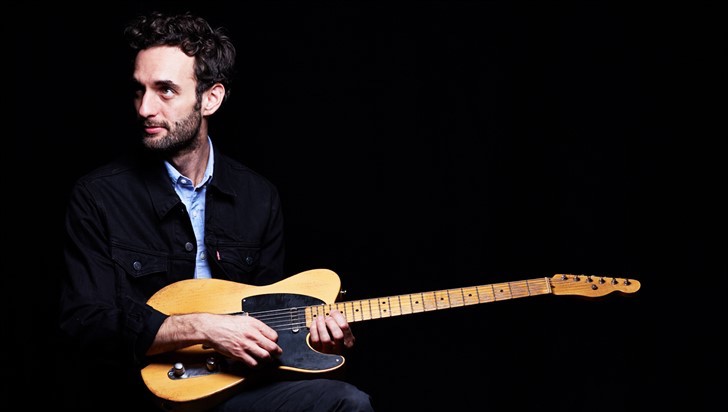Spotlight: Julian Lage

Julian Lage has been acknowledged as a master guitarist for more than two-thirds of his life, which may not seem like that big of a deal until you take into account that he celebrated his 30th birthday last Christmas Day. When he was only eight years old, the Northern California native jammed onstage with Carlos Santana and was the subject of a documentary film (appropriately titled Jules at Eight). At 12, he played at the Grammys and, at 15, he became a faculty member at the Stanford Jazz Workshop. Before exiting his teens, he’d joined the band of jazz vibraphone great Gary Burton and, at 21, Lage released his debut album as a leader, Sounding Point, which included contributions from Chris Thile and Béla Fleck.
“I had a blast as a kid,” says Lage, phoning from Pisa, Italy, in January while on tour. “But I remember getting attention and thinking, ‘Wait ‘til I get really good.’” That modesty is characteristic but also unnecessary: Lage got “really good” really quickly and, today, he is undeniably one of the most creative and virtuosic axemen working within any genre. He’s habitually classified as a jazz musician but, in recent years, he’s diversified, thirsting for new means of expression.
That musical wanderlust is currently on display on Modern Lore (Mack Avenue), Lage’s most recent album, which traverses blues, rock and country as well as jazz. It’s Lage’s second release with the trio of bassist Scott Colley and drummer Kenny Wollesen, and the second to showcase him on electric guitar.
“In a lot of ways, it’s a prequel to the last record, Arclight,” says Lage of Modern Lore, which features 11 original compositions. “This is grooving music. The songs have the sensuality of a three-minute song but they lend themselves to a live, improvisational, more jam-oriented aesthetic. On Arclight, there were so many new components that I wanted to make a point about the vibe and the sound and the tempos.”
Lage has played and recorded as a solo guitarist, in duos (he’s made albums with Wilco’s Nels Cline, Punch Brothers’ Chris Eldridge and pianist Fred Hersch) and with larger ensembles, but he finds the trio format to be the best fit for his style—at the moment. “If people want to hear me play right now, they’ve gotta hear the trio,” he says. “For me, it’s kind of relationship-driven. I just love it. But I feel that I kind of play the same way with all of my projects; it’s just contextualized differently. Even with the bluegrass stuff I’m involved with, I’m playing the same vocabulary, except that I’m holding an acoustic guitar. With Fred, there’s a piano, so it’s an orchestral study.”
Lage’s evolution has come naturally. When he cut his debut album in 2009, he says, “I was newly in the position of being a bandleader and I remember strongly that I wanted to be a sideman in my own band—a supportive character—even though it was my name up there. We were doing these ensemble—almost chamber music—things but, after a certain point, I realized I was hiding in plain sight. I was writing myself into a corner a lot of times. That was the least functional role. But it’s part of a journey. You say, ‘Well, where do I fit in?’ Now, it seems there’s a certain celebration of the guitar—playing it, not being shy about it.”
In 2013, however, Lage learned a hard lesson when he suffered a traumatic hand injury that threatened to curtail his career just as it was truly taking off. While performing live, Lage experienced spasms in his left hand; he was unable to play and subsequently underwent treatments to regain his abilities. But, he says, “The injury was good because I hadn’t thought about a lot of the things that go into playing guitar. I didn’t feel like I needed to. Academically, I felt I knew what was good classical technique but I learned, from injuring myself, that a lot of things that were proper technique were really out of line with the design of the body. It was almost like I had been asleep for 18 years. I thought if I held my hand this way it was right, but maybe that worked when I was a small child. I was playing it as a kid would. [The injury] got me more in touch with stature, movement, playing faster—as a way of embracing movement almost as a therapeutic thing and not being so precious with everything.”
That positive outlook is palpable in Lage’s music, a trait he’s carried around since his prodigy days. He’s even comfortable with that word, where many artists who display an outsized gift at such a young age try to shuck it as soon as they can. “Prodigy is the word people used to talk about me, or talk to me, but it didn’t come with any pressure,” he says. “I’m surrounded by such good people. I’m lucky. I take my cues from them. My parents are so clearheaded about everything. They’re brilliant and very empathetic, especially to the concept of exploitation. No one was putting more pressure on me than I was on myself.”
That early experience, he says, provided the grounding that he draws on now. “The community of musicians that are alive today and working is just tremendous,” says Lage. “I think that’s probably true of any generation—we just happen to be around now.”
This article originally appears in the March issue of Relix. For more features, interviews, album reviews and more, subscribe here.



















